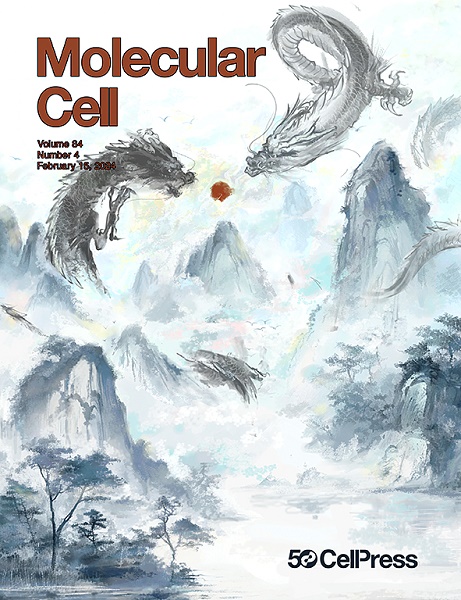TRIM24通过染色质信号传导指导复制应激反应维持ALT端粒
IF 14.5
1区 生物学
Q1 BIOCHEMISTRY & MOLECULAR BIOLOGY
引用次数: 0
摘要
无法复制基因组会导致复制压力和基因组不稳定。在这里,我们在人类癌细胞中开发了生物素化lac操作符(LacO)阵列复制应激蛋白网络识别(BLOCK-ID),这是一种蛋白质组学方法,用于识别和可视化应激复制分叉处的蛋白质。该方法确定了复制应激反应的介质,包括染色质乙酰化解读蛋白三方基序24 (TRIM24)。我们发现TRIM24在协调端粒选择性延长(ALT)中的关键作用,这是一种复制应激导向的端粒延长机制。我们的数据显示,TRIM24通过p300/CREB结合蛋白(CBP)依赖的乙酰化染色质信号级联被募集到端粒,以组织alt相关早幼粒细胞白血病(PML)体(APBs)的组装,并促进端粒DNA的新生合成。TRIM24在端粒上的拴系足以刺激端粒DNA以小泛素样修饰剂(SUMO)依赖但p300/CBP和pml独立的方式重新合成。总的来说,这些发现揭示了一个不可缺少的表观遗传信号通路,涉及TRIM24和p300/CBP,介导alt端粒维持。本文章由计算机程序翻译,如有差异,请以英文原文为准。

TRIM24 directs replicative stress responses to maintain ALT telomeres via chromatin signaling
An inability to replicate the genome can cause replication stress and genome instability. Here, we develop biotinylation of lac operator (LacO) array replication stress protein network identification (BLOCK-ID) in human cancer cells, a proteomic method to identify and visualize proteins at stressed replication forks. This approach identified mediators of the replication stress response, including the chromatin acetylation reader protein tripartite motif containing 24 (TRIM24). We uncovered a crucial role for TRIM24 in coordinating alternative lengthening of telomeres (ALT), a replication stress-directed telomere extension mechanism. Our data reveal that TRIM24 is recruited to telomeres via a p300/CREB binding protein (CBP)-dependent acetylation chromatin signaling cascade to organize the assembly of ALT-associated promyelocytic leukemia (PML) bodies (APBs) and promote de novo telomere DNA synthesis. Tethering of TRIM24 at telomeres was sufficient to stimulate de novo telomere DNA synthesis in a small ubiquitin-like modifier (SUMO)-dependent but p300/CBP- and PML-independent manner. Collectively, these findings uncover an indispensable epigenetic signaling pathway involving TRIM24 and p300/CBP that mediates ALT-telomere maintenance.
求助全文
通过发布文献求助,成功后即可免费获取论文全文。
去求助
来源期刊

Molecular Cell
生物-生化与分子生物学
CiteScore
26.00
自引率
3.80%
发文量
389
审稿时长
1 months
期刊介绍:
Molecular Cell is a companion to Cell, the leading journal of biology and the highest-impact journal in the world. Launched in December 1997 and published monthly. Molecular Cell is dedicated to publishing cutting-edge research in molecular biology, focusing on fundamental cellular processes. The journal encompasses a wide range of topics, including DNA replication, recombination, and repair; Chromatin biology and genome organization; Transcription; RNA processing and decay; Non-coding RNA function; Translation; Protein folding, modification, and quality control; Signal transduction pathways; Cell cycle and checkpoints; Cell death; Autophagy; Metabolism.
 求助内容:
求助内容: 应助结果提醒方式:
应助结果提醒方式:


